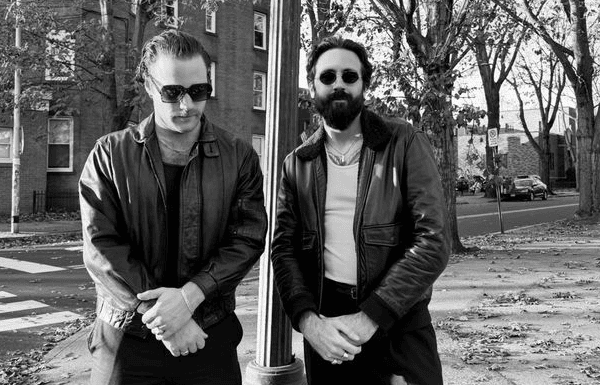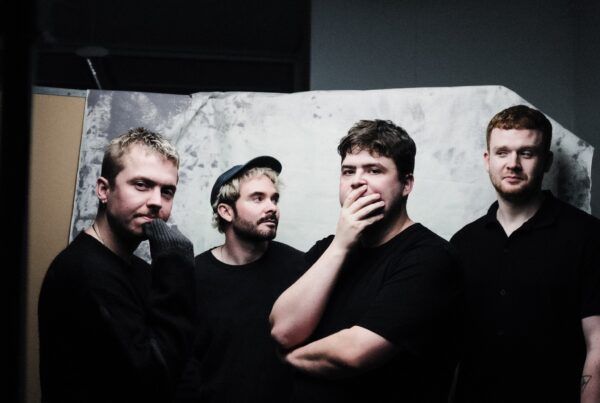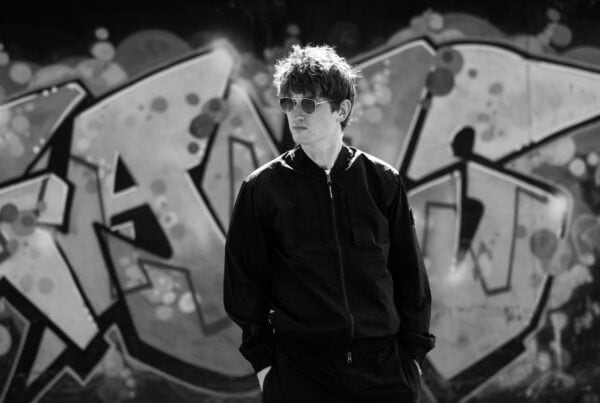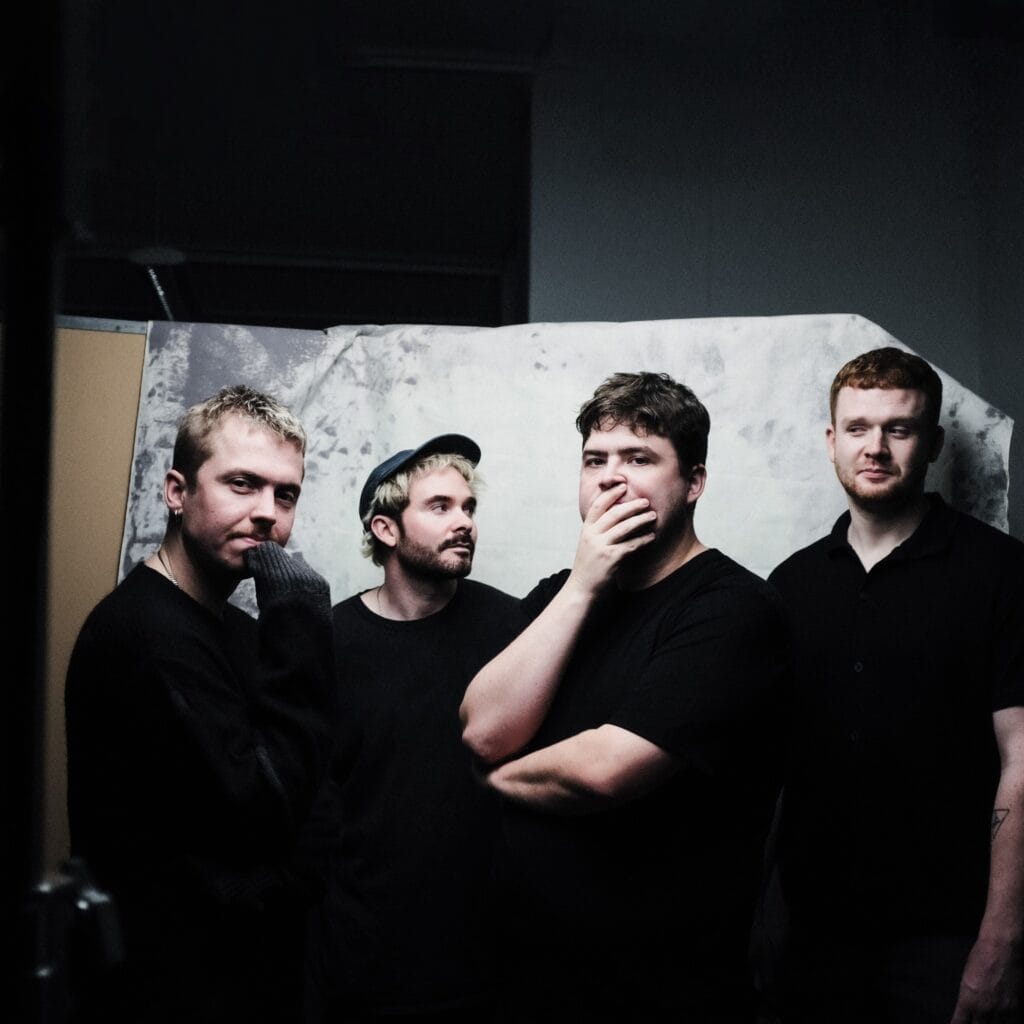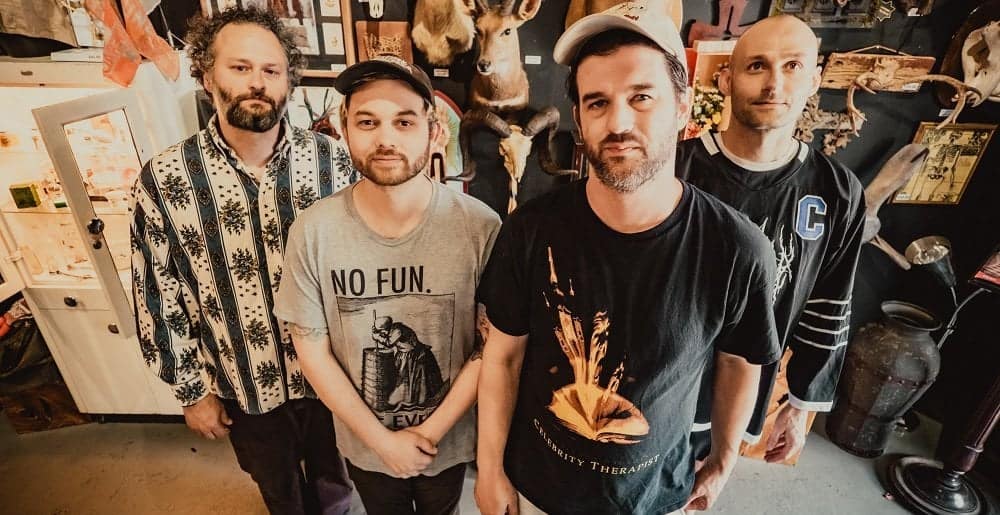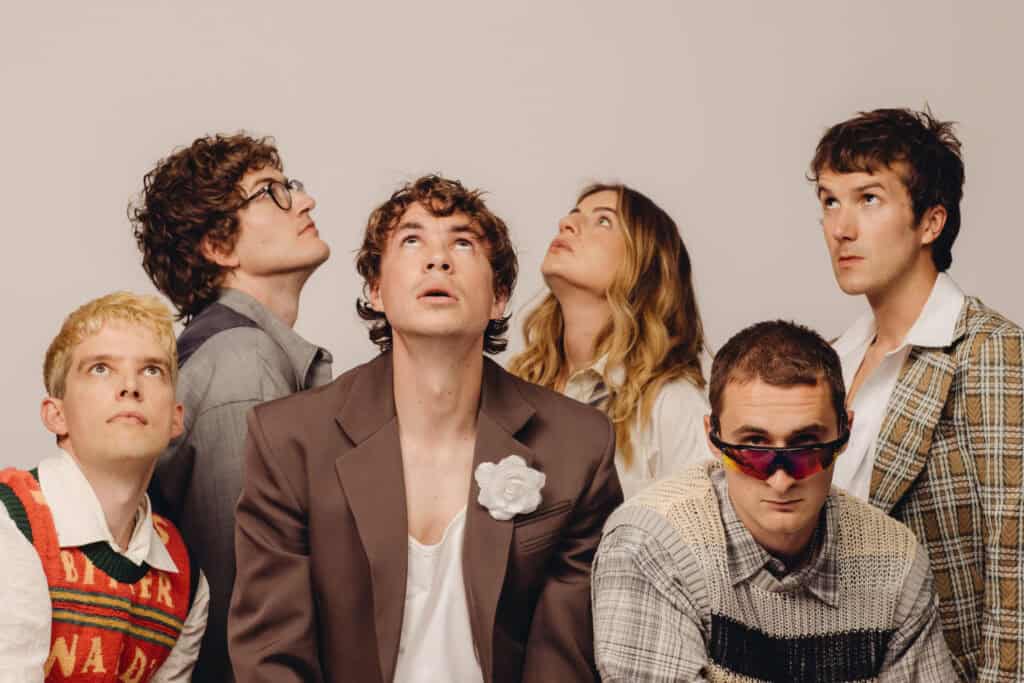With a unique blend of emo, hip-hop and alternative metal, nothing,nowhere (Joe Mulherin) has been making waves in his respective scenes since his album debut in 2015. I had the pleasure of discussing his new album, “Void Eternal”, which is his most ambitious and introspective work yet. In the interview, we delve into the creative process behind the album, the themes explored, and his approach to live performance. So sit back, relax, and let’s dive into the mind of Nothing, Nowhere.
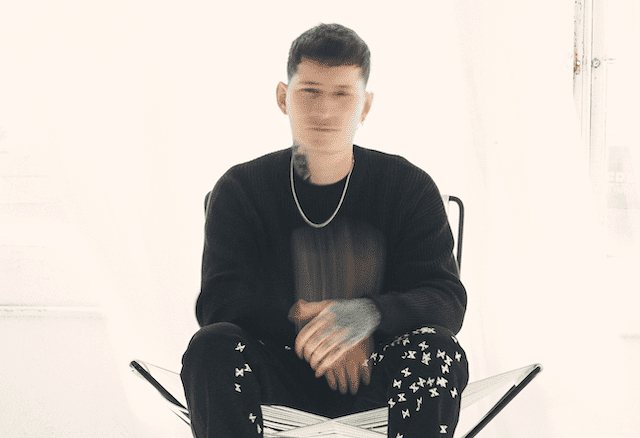
CORBAN SKILLANDER: I’m Corban Skillånder, here to do an interview today with Nothing. Nowhere.
NOTHING, NOWHERE: I am nothing, nowhere.
CS: The man himself! First things first: I listened to the album earlier today a couple times and the first thing that really struck me was Linkin Park, and them being a huge influence. It’s quite timely – Meteora turned 20 the other day, which is absolutely insane.
NN: Yeah, we’re getting old. (laughs)
CS: Yeah, honestly! I’m only 25 and it’s still I still feel it. But yeah, I can really hear you channelling them, especially on songs like PSYCHO_PSYCHIATRY. You talk about how you want to create with “zero outside influence”, and Linkin Park themselves were really staunch about that. They changed their sound through their career because that was what they wanted to make, not what the fans expected of them. Do you feel like you’re successfully doing that? Do you feel like that’s something that you’ve done on this album?
NN: Totally – I just approach music from it being a personal pursuit for me. It’s not a business venture, you know what I mean? It’s an artistic pursuit. I definitely always, from when I started nothing,nowhere, I made sure to make it clear like “hey like I just want to make music for me” and explore what I can come up with, and the genre is always secondary to the emotion, you know what I mean? And I think I’ve been really lucky to have supporters and a fan base that are kind of cool with whatever I do! Like I said, I think that the emotion and the honesty and the lyricism comes first and then the sort of genre is just secondary, it’s the package in which it’s delivered. It’s been really cool. I never want to get stale. I want to be trying something new, you know, challenging myself.
CS: Yeah, absolutely, that’s a really important thing to do. It’s really good that you feel like you can do that because I guess for a lot of people, it can feel like when people come to expect one thing off them, that’s kind of what they’re locked into.
NN: Yeah, exactly, that’s a big issue with rock music and heavy music too, like it’s great when fanbases are cool with an artist expressing themselves because I don’t think any artist ever really wants to make the same album over and over again.
CS: Yeah, I mean it’s the same, again to go back to Linkin Park, if they would have carried on doing the first two albums it would have got stale after a while. Just to kind of go down the line of you talking about emotion and channelling that into your music: You talk about “channelling sadness into positive aggression”. Can you sort of elaborate on what you mean by that, and your lyrical content and the mood that you set with your albums?
NN: Yeah, I feel like I’m really lucky to have a positive outlet to put these sorts of difficult emotions into. Because if I didn’t have music, if I didn’t have a microphone to scream into, I don’t know where I would place these emotions, you know? It’s, instead of, like, self-sabotage or resorting to substance abuse or something, my guitar and a microphone is always there, so I’m really lucky in that regard. I think with Void Eternal, you know, I’ve kind of struggled with anxiety and depression my whole life, like clinically, for a long time, and I think as I get older I’ve had to grapple with some anger that I’ve been feeling about years that were taken from me, and basically Void Eternal was just me kind of screaming out all that anger, and yeah, when you’re done with it: You feel a little bit better.
CS: I totally feel that it’s that kind of thing, you get that aggression out as a therapeutic form of expression.
NN: It’s the best!
To kind of talk more about that aggression – I definitely felt like this is the most “in-your-face” album that you’ve done. You’ve got features on there from Lorna Shore, Senses Fail, Underoath – some of the most revered post-hardcore and modern metal bands that are in the scene, and have been in the scene for a while. Do you think, for yourself, that there was an element of wanting to impress these people with your music? Or do you think at this point, five albums in, that there’s an element of confidence that naturally comes with that?
NN: Yeah, on the confidence thing. Like you know, you’re a musician. You can relate, you know you always have some level of self-doubt. I feel like a lot of artists do, across the spectrum of the Arts. You have that voice that says, “you shouldn’t be doing this” or “you’re not good enough”, and it took me a long time to finally get to a healthy spot where I could just be like, “well I put in the time. I’ve been doing this since I was 12 years old like I deserve it! I deserve to be here!” And I think it’s more of a celebration for me to be able to work with a lot of my idols, and to grow up listening to bands like Underoath and Senses Fail, Silverstein, Fall Out Boy, and to have all of those bands on my record… It’s really just like it’s like the script for a movie! You know what I mean? I don’t even have words for it. It’s amazing.
Was that kind of like a point for you, when you were maybe physically in a room or just talking to these people, was it a point where it kind of “clicked” and you were like “Damn. I’m doing alright!”
NN: Yeah, I think I’m starting to get there. Like I said, for years, I don’t know, from certain instances growing up I just have never had an amazing level of self-confidence or self-belief, and that had to come with time, and it certainly helps when you have someone like Pete Wentz on your song telling you that that he loves it. It’s really reassuring. Like, I was hanging out with the Underoath guys the other day and we were shooting a video for Venom off Void Eternal, and I had a moment where I was like, “Oh, we’re just hanging out!” like we’re peers. I’m not at a meet ‘n’ greet or something!
You recently mentioned on Twitter that you kind of “came up” playing in bands to like three to five people audiences in Massachusetts. With the amount of growth that you’ve had, do you think now, playing Arena shows with the likes of Fall Out Boy, that your performance style has changed?
NN: Yeah, I think I’ve gotten a lot better at it! (laughs) Sometimes when we start a tour I’ll go on YouTube and just look at old videos for reference, and I can’t help but cringe at some of my old performances. You think that you’re doing a lot better than you are, but it’s really like anything else, you’ve got to put the time in, and the only way to get better performing is to just do it more! To be playing in front of 15,000 people on a Fall Out Boy tour is much different than playing at my local Knights of Columbus Hall in Foxborough, Massachusetts to a few people! (laughs) But I think no matter what, if you’re being honest and you’re just giving your best effort, and you’re trying to put on a show: that’s all that matters. Doesn’t matter if there’s 3 people or 30,000 people.
Totally yeah! It’s all about the attitude going into it. I guess if you’re going into a show as if it’s a smaller home show, people have a much more intimate time. Do you miss that at all at this point?
NN: It’s a love/hate thing. You know what I mean? Like I miss the feeling of “Me Against the World” you know? Having a chip on my shoulder, trying to prove myself. And I still do, even though I have these bigger tours now, and I have a lot of amazing features and things like that, I still have a chip on my shoulder, because I remember what it was like to be in a seedy little club in Providence Rhode Island handing out mixtapes to people, and people throwing them in the trash. So I think I’ll always have that, but I do miss that, kind of, but I definitely don’t miss, you know, seven dudes sleeping in a van in the middle of a blizzard and waking up with strep throat. I don’t miss that!
CS: Honestly. And load-in!
NN: Honestly. (laughs)
CS: So you released the “Nothing, Nowhere LP” back in 2015, and despite that not being too long ago really, we’ve seen a marked change in the way that people find new music and consume their content. Gone are the days of sitting down and watching MTV, writing down the names of artists you like from the videos, and then opening up Limewire on the family computer. I kind of want to ask your opinion on that: do you think that organic growth as an artist, things like going to places and handing out mixtapes, is still a thing that’s possible today?
NN: No, if I’m being honest. I think it would be a miracle. Even touring, man, like if you’re a band and all you do is tour, and you’re not active on the internet, you’re at such a massive disadvantage. Love it or hate it, I guess you’ve got to adapt to the change. As much as I wish that people would discover me on Limewire! (laughs) It’s just not the case anymore. It’s kind of crazy. Especially with something like TikTok. You just don’t see that type of overnight success in any other pocket, but at the same time you have to be careful, because if you blow up overnight on something like TikTok, you don’t have that core “Die Hard” fanbase that’ll be there for the next thing that you do. So I think it’s important to mix the new with the old – make sure that you’re making personal connections with people and don’t forget that music is a visceral connection with your listeners.
CS: Yeah, I mean that personal connection is something that I think a lot of people are maybe missing.
NN: Yeah, you know, and another thing too with social media is that people start making certain types of songs just for the engagement, for the clicks, and for that initial dopamine hit that you get when something starts to go semi viral, and that’s cool, but it also could be dangerous. So yeah, I don’t know what the future holds, but it’s interesting.
CS: It’d be interesting if anyone did at this point! The scene of everything is changing so fast.
NN: And everything’s just going to be AI, I guess!
CS: It’s scary, man! It makes me worried for a future career in music, because I’m like “is some kind of algorithm going to be able to come up with like a much sicker riff than I could come up?”
NN: Oh absolutely, it’s crazy. I don’t know, I mean, like, does a computer genuinely understand depression? I don’t know, probably not, but who knows you know?
CS: Yeah, and even if it doesn’t understand it, can it emulate talking about it? Well, before we get too scared and depressed I’ll move on! (laughs) I kind of want to go back to what I was saying before about influences and stuff. After listening to the album I kept really coming back to the idea that a lot of the influence comes from that kind of “Early 2000s Nu-Metal era. That sort of, “Breaking Benjamin”, “Crossfade” “Unloco”, “The Matrix soundtrack” kind of sound. I was in school myself at that time and I remember the total cultural event that was “Collision Course” by Linkin Park and Jay-Z.
NN: Oh my god!
CS: Honestly, and the two really divided groups that were like at each other’s throats were suddenly both enjoying the same thing. And this album, it really has that. As much as I can hear Alexisonfire and Blink, I can hear Tyler, Kendrick, DOOM, Juice WRLD. Did you grow up in both those scenes? Is this something that comes naturally to you, or do you think it’s something you’ve discovered after and incorporated that?
NN: I mean, I started listening to heavy music and rap at the same time. I guess I started listening to rap before I listened to heavy music. I got into heavy music when I was probably like 12, but I remember listening to Eminem when I was like 10 or something, just like really really young.
CS: Way too young for a lot of Eminem stuff. (laughs)
NN: Yeah, yeah, my mom? Did not like Eminem. But yeah, like you said, MF DOOM. I was always really into DOOM, and I was into De La Soul, A Tribe Called Quest, stuff like that, and then I got older and I kind of got into like Dipset, and Cam’ron and Gucci Mane. I remember I had like a Hyundai Sonata; it was my first car and I put these two 12-inch Sony Xplod subwoofers in the back, and I would just like put on Cam’ron or something, and just listen to rap as loud as I could. I was that asshole when I first got my license! But nah, like you were saying for Collision Course – I’ve always just loved the combination of genres. I love it. I think that you get really unique stuff and that’s kind of what Nothing, Nowhere was birthed on. I started mixing I guess emo stuff with rap stuff in like 2014, 2015 and I want to continue to explore those avenues throughout all of Nothing, Nowhere, but do it in different ways. I just want to keep myself entertained, you know?
CS: Yeah, it definitely sounds like you’re doing this for you. You’re doing it to for your own creative process.
NN: Yeah, because if you’re not writing music for yourself, what are you writing it for? I know Rick Rubin has a thing where he’s kind of like, “when you’re making music the audience should be the last people that you consider”, I don’t know if that sounds pretentious or anything, but it’s kind of true in a sense. That’s why you start making music. I think for me, and I think for a lot of people, you started it because you had something to say, and you had emotions that you wanted to get out, and that’s just the philosophy that I’ve carried on throughout my entire career.
CS: Absolutely yeah, that can be quite refreshing to hear in a state where there’s a lot of music out there where, you know, it’s people striving to kind of “beat that algorithm”.
NN: It’s dangerous!
CS: Yeah, it’s dangerous for everyone, I think. In the creative sector. I think having a sense of artistic integrity is important.
NN: Yeah, for sure.
CS: And just to kind of go down the line of questioning about the production of the album as well, you went into, was it a restored band that you set up as a studio?
NN: Yeah, I live on 10 acres, and I and the house that I bought had an old barn, and I ended up changing it into a studio. I renovated it and yeah, that’s where the whole album was recorded.
CS: Nice! It’s funny, we’re seeing a lot of artists do that, even ones that have sort of access to these insane fully kitted out studios. People tend to be going more the DIY route and self-recording and self-producing. Why did you choose to do that? What was that decision process like choosing to record it all yourself?
NN: I just don’t like cities at all. I don’t like being in cities. I live in a town with less than 2,000 people in it on the Canadian border, and yeah, all my neighbours are just farmers. They don’t listen to, well I don’t know what they listen to, maybe John Denver (laughs). But that’s me, when I started making music as a kid I made it by myself in my parent’s basement, and then when I started Nothing, Nowhere I made it in my parent’s basement! I just never grew up going to Studios or really caring about Studios, and when I first signed to a label, I did do the studio thing. I’d go to LA, and I recorded Reaper in LA, I recorded Ruiner in New York City, but as much as I like that experience, I just think that it was missing that sort of “home cooked” feeling. And yeah, I’m just extremely introverted by nature and I don’t necessarily want to hear like a road rage fight outside my window! (laughs) It helps me focus, really.
CS: I think a lot of the thing is that sense of comfort that you get from it, so just the environment itself, you’re not feeling the pressure of “I’ve got to go in at 9AM and then leave by whatever time at night”.
NN: Yeah, that’s true.
CS: You got Taylor Morgan who’s the Garden Avenue Music collective guy, right? Did you know Taylor beforehand?
NN: Yep! It was actually Taylor Morgan and Brody McKeegan – they’re friends of mine – and they’re both in Garden Avenue, they make really amazing stuff, they produce for a lot of underground rappers. I just met them through SoundCloud back in the day, and I just basically had them up to my house. I had them, and I had my guitarist, Blake, he plays guitar for me on tour, he used to play in Counterparts and Gideon and Huntress, yeah, we just basically just hung out, and I have like an original Xbox and like an N64 in there. We’d just play like MX vs. ATV Unleashed and just take turns on the computer, and it felt like when you’re growing up as a kid and you try and make a demo at your friend’s house. That’s literally what the entire process was like for Void Eternal!
CS: That sounds perfect. That’s such a great environment, there’s no, like you said, no pressure. It’s just: when creativity strikes you feel like you can move six feet to the left and get going.
NN: Yeah, absolutely, and I feel like you can tell on the record, too. It just feels natural and normal, it doesn’t like anything’s forced. Anything that’s on the record is just stuff that I wanted to make and that I had fun making.
CS: If you don’t mind me asking, how much material did you come up with for the album? Was there a lot of stuff, did you get stuff from the back burner?
NN: Yeah, kind of notoriously, for my last record Trauma Factory, I had upwards of 90 songs that I had to use. This one, I toned it down, but I think I have like 40 songs which is still crazy. But you know, I’m here at my house and I make music every day, so it’s just kind of like “what else am I going to do?”
CS: I feel you. So, I’ll let you go and carry on rehearsing, but just as like a final question: I can tell from the way that you talk and how you write that you’re just a music fan. You’re a real lover of music. What are you listening to at the moment? Is there anything lesser known that you’ve heard recently that you think people should check out?
NN: Oh, yeah. (laughs) Yeah, am I ever. If people are on the Midwest Emo kick, there’s a band called Ben Quad that I’ve really been into lately. There’s a hardcore band called Grid Iron that I’m really obsessed with lately. This band Boundaries just released an amazing record recently, and then there’s this other sort of like deathcore band called Techtosa – they’re kind of like a metalcore band. I just think that they’re unbelievable. I’ve been listening to a lot.
CS: That’s fantastic. Great stuff. Thanks so much for sitting down with me, I really, really appreciate it.
NN: Thank you so much, appreciate it!
Listen to the full interview here:

